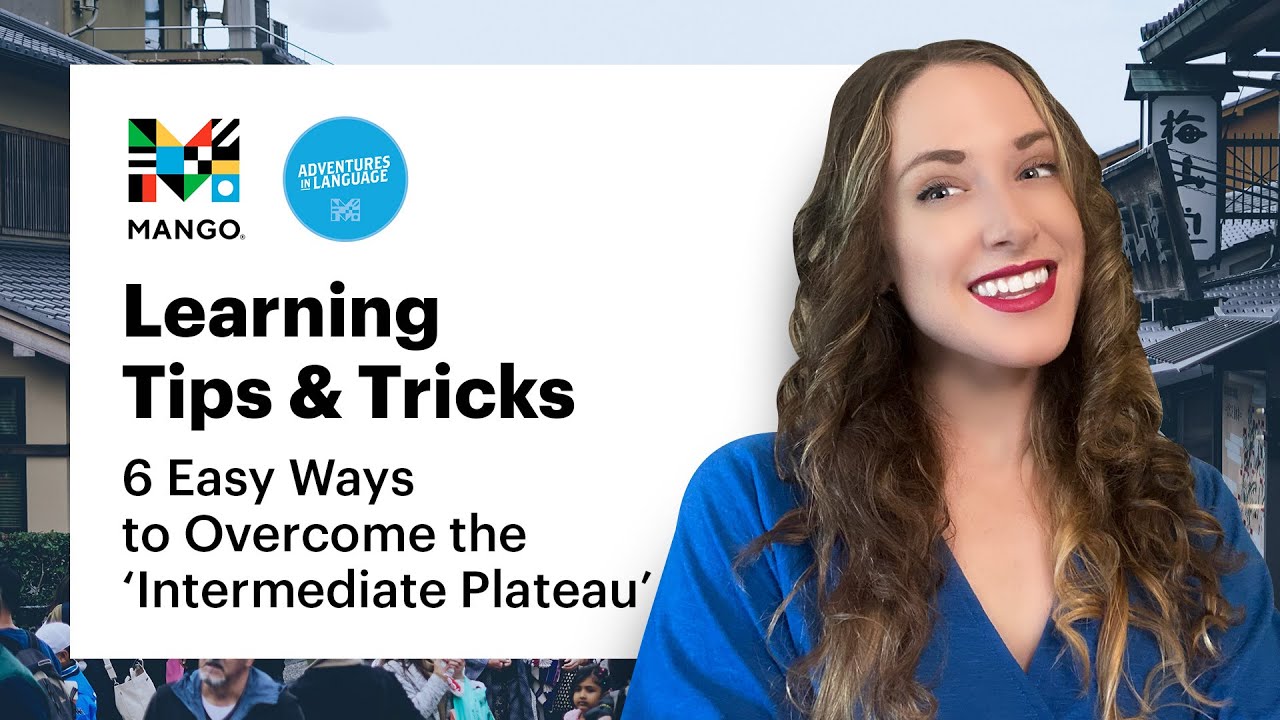Getting over the intermediate plateau in language learning
Summary
TLDRThis video script discusses overcoming the intermediate plateau in language learning. It suggests moving beyond textbooks and engaging with native speakers to learn idiomatic expressions. The script promotes learning phrases as 'chunks' for faster progression and highlights the benefits of platforms like Lingoda, which offer immersive, small-group lessons. It also encourages consuming media in the target language actively and getting feedback on one's current level to refine skills. Lastly, it emphasizes the importance of daily practice and varying learning methods to maintain momentum and advance from intermediate to advanced proficiency.
Takeaways
- 😀 The intermediate plateau in language learning is a phase where one feels stuck after reaching a comfortable level of communication but still struggles with vocabulary and grammar.
- 📚 To overcome the plateau, learners should stop relying on textbooks and old notes and instead focus on speaking with native speakers to pick up phrasal verbs, idioms, and collocations.
- 🌐 Learning by 'chunking' or whole phrases helps intermediate learners to advance faster without worrying about word order or grammar.
- 📈 Lingoda, an online language school, offers immersive learning experiences through small group lessons and encourages the use of materials across different levels.
- 🏆 Lingoda's sprint program offers a refund incentive for completing a set number of classes, which can motivate learners to improve their language skills within a specific timeframe.
- 🎯 To move from intermediate to advanced, learners should start consuming media and content in the target language, both actively and passively.
- 🔍 Intermediate learners should actively look up words while reading in the foreign language to improve their vocabulary beyond just understanding the context.
- 🎥 Getting a current language level check through self-recorded videos or writing can help identify areas for improvement, especially with the help of native speakers.
- 📝 Learning and using synonyms can help diversify one's language use and move beyond basic vocabulary.
- 🔄 Consistent daily effort is crucial for language advancement; even during busy times, utilizing 'dead time' for language learning can be effective.
- 🛠️ Changing up language learning methods, such as trying new apps or tutors, can keep the learning process fresh and engaging.
Q & A
What is the intermediate plateau in language learning?
-The intermediate plateau is a stage in language learning where a learner feels stuck after reaching a comfortable level of communication in a foreign language but still struggles with vocabulary or grammar.
Why do people often stop actively studying once they reach the intermediate plateau?
-People may stop actively studying because they feel they have reached a level where they can communicate effectively, leading to a decrease in motivation to continue learning.
What is the initial progress like in the first three to six months of learning a new language?
-In the first three to six months, the progress is very fast, going from knowing nothing to being able to introduce oneself, order things, and talk about personal experiences.
How can focusing on speaking to native speakers in context help overcome the intermediate plateau?
-Speaking to native speakers in context helps learners pick up phrasal verbs, idioms, collocations, and other language nuances that make them sound more native.
What is the concept of 'chunking' in language learning?
-Chunking is an approach to learning set phrases as whole concepts, which helps learners not worry about word order or grammar and advance faster.
How does Lingoda's teaching method support learners in moving from intermediate to advanced levels?
-Lingoda teaches by chunking and provides an immersive experience through small group lessons with good teacher control and interaction, which helps learners progress from intermediate to advanced levels.
What is the Lingoda sprint and how does it work?
-The Lingoda sprint is a program designed to improve language learning in three months. It offers two options: the super sprint with 30 classes a month for a 100% refund upon completion, and the sprint with 15 classes a month for a 50% refund.
What is the importance of consuming media in the target language for intermediate learners?
-Consuming media in the target language helps increase fluency by providing both active and passive learning opportunities, and by exposing learners to advanced vocabulary and language structures.
Why is it recommended to get a current language level checked properly?
-Getting a current language level checked helps learners identify mistakes and areas for improvement, which is crucial for advancing to the next level.
How can learning synonyms help an intermediate learner advance to an advanced level?
-Learning synonyms allows learners to replace basic words with more advanced and specific terms, enhancing their vocabulary and making their language use sound more native.
What is the key to maintaining and improving language skills even when feeling comfortable at an intermediate level?
-The key is to put in daily effort, using the language actively in various contexts, and seeking out new learning methods to keep the process engaging and effective.
Outlines

This section is available to paid users only. Please upgrade to access this part.
Upgrade NowMindmap

This section is available to paid users only. Please upgrade to access this part.
Upgrade NowKeywords

This section is available to paid users only. Please upgrade to access this part.
Upgrade NowHighlights

This section is available to paid users only. Please upgrade to access this part.
Upgrade NowTranscripts

This section is available to paid users only. Please upgrade to access this part.
Upgrade NowBrowse More Related Video

6 Easy Ways to Overcome the 'Intermediate Plateau' | Learning Tips & Tricks

How to Actually Learn a Language as an Adult

NO PROGRESS? Stuck in the INTERMEDIATE PLATEAU? Use THIS FRAMEWORK to overcome!!!

How to Overcome the Intermediate Language Plateau

MAHARAH ISTIMA' || Metode Pembelajaran Keterampilan Mendengar Bahasa Arab, Fase dan Evaluasinya

6 CHEAT CODES to Learn a Language FAST
5.0 / 5 (0 votes)